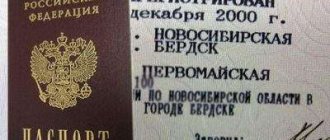Actual residence address: what does it mean?
The institution of registration existed in the Soviet Union and even before its appearance. It was permissive. In 1991 it was declared unconstitutional. Instead, another procedure appeared - registration at the place of residence.
Important! Despite the fact that registration in Russia has long been abolished, citizens of the country are still obliged to inform government agencies about where they live.
After the abolition of registration, temporary and permanent registration appeared, as well as the concept of “address of actual residence.” This is the living space in which a person actually lives most of the time. Moreover, this means the place where the citizen actually lives, and not according to documents.
People can live in various categories of residential premises:
- apartments;
- residential buildings;
- other types of residential premises.
Reference! It is absolutely not necessary for a person to have ownership rights to the premises in which he actually lives. He may have a variety of reasons for this: a lease or rental agreement, family ties with the owner of the property or close relationships with him. Even just permission from the owner of the property is theoretically quite enough for it to be considered a place of actual residence.
It is also useful to read: Permanent residence
The advantage of a physical address
Temporary registration with a physical address provides citizens with the same rights as at a permanent place of residence:
- Official work.
- Social benefits.
- Free medical care.
- Possibility of using all benefits, as with registration at the place of residence.
By registering the specified address, you will not only legalize your stay, but will also be able to take advantage of all the rights enjoyed by citizens with permanent registration.
You can travel around the country and work where necessary, while maintaining all benefits. There is no need to change your permanent residence address.
You can find out answers to the most frequently asked questions about registration at a place of temporary or permanent residence by watching the video:
See also Phone numbers for consultation Jan 18, 2021 kasjanenko 957
Share this post
Discussion: 3 comments
- Anna says:
12/08/2017 at 11:29It is necessary to follow all registration rules, since at some point you will have to contact the services, and there will be problems with documentation and you will still have to solve them. Therefore, it is better not to delay registration when changing your place of residence.
Answer
- Anna says:
04/16/2018 at 03:29
Temporary registration is required in cases where you plan to work, study, go to school or kindergarten in a new place, and, accordingly, visit a hospital. If your stay is limited to recreation, for example, then registration is not necessary.
Answer
- Sergey Petrovich says:
07/04/2020 at 03:41
According to the Constitution and the Education Law, everyone has the right to receive secondary education in our country. Hence, whether the law on registration contradicts the basic laws. How to get an answer?
Answer
Place of stay and place of actual residence: differences
Documents often contain several columns for indicating different addresses. This leads to confusion, because a person does not know where and what should be entered. But dealing with this point is not at all difficult.
Free legal consultation
+7 800 350-51-81
It is also useful to read: Registration of citizens by place of residence and place of stay
Place of residence is an apartment or other housing where a person permanently resides and is registered. It is also commonly called constant. In fact, this is an analogue of permanent registration that existed in the past. A note about this type of registration is made in the citizen’s passport. They place it in departments of the Main Directorate for Migration and Migration or passport offices.
Important! Although registration is of a notification nature, this does not mean that it is not mandatory. Its absence in some cases can cause various problems for a person.
The place of stay is also a living space, but a person lives in it temporarily. For example, this could be a hotel room, a rented apartment in another constituent entity of the Russian Federation, etc. This residential property is registered temporarily, for which a corresponding certificate is issued in the form of a separate document. Some consider such registration to be analogous to the temporary registration that previously existed in the past.
It is also useful to read: Features of a temporary residence permit and how to obtain it
This video explains how to make temporary registration at your place of stay:
Reference! Temporary registration does not in any way replace or cancel permanent registration. They can exist simultaneously. When registering, a person is not deregistered at his permanent registration address. Many people forget about this.
The actual residential address is the place where a person directly lives. It does not matter whether he has registration in this residential premises or not. On the contrary, quite often this concept is used to refer to the address where a person lives, but is not registered for various reasons.
Important! In most cases, you can contact government agencies and receive various documents from them not only at your permanent or temporary registration address, but also at your place of actual residence. This norm is enshrined at the legislative level. For example, this is quite acceptable when applying for the disposal of maternity capital.
Do the addresses have to match?
Population migration within modern Russia occurs constantly. Some people move to another city or even region permanently, others only for a while, and still others spend most of their lives moving between different parts of the country. The state does not particularly prevent this, although it does require in certain situations to report a change in the place where a person lives. Especially when it comes to permanent residence.
Quite often, people find themselves permanently registered in one city, have temporary registration in another, and actually live in a third. There's really nothing wrong with that. The address of actual residence and place of residence do not have to coincide at all.
Moreover, the addresses of permanent and temporary registration cannot coincide at all. It just doesn't make sense. If a person is already permanently registered in the same apartment (house), then why also temporarily register in it.
The address of actual residence and permanent registration may also not match. Moreover, in the following cases, temporary registration may also be absent or issued in a completely different place:
- The person actually continues to live in the same region where he has permanent registration. There is nothing wrong with this and there will be no violation of the law. He is not required to obtain a temporary certificate of residence in another place.
- In fact, a person will live in another region for less than 90 days. In this case, the law also does not require submitting any additional notifications to the Main Directorate for Migration and Migration or other government agencies.
- A person does not need to register temporarily if he is registered in Moscow, but actually resides in the Moscow region or vice versa. The situation is similar with other cities of federal significance. There is no need to obtain temporary registration for persons permanently registered in the Republic of Crimea, but living in Sevastopol, or registered in St. Petersburg, but actually living in the Leningrad region. This rule will also work in reverse.
At the address of actual residence, regardless of whether it coincides with the place of registration or not, you can receive the following types of government services:
- register your child in kindergarten or school;
- obtain a foreign passport (but the time frame for issuing it will be longer);
- apply for a pension (if you do not have permanent registration);
- seek medical help;
- change your Russian passport (for example, upon reaching the age of 20, 45 years);
- obtain a driver's license;
- register the vehicle after purchase;
- apply for the use of maternity capital.
Documents confirming residential address
It is easy to confirm your residential address if you have permanent registration at it using your passport. A corresponding mark is made in it. It is affixed by employees of the Main Directorate for Migration Affairs or the passport office. The mark also indicates the date when the person was registered in this residential premises.
The fact of residence at the temporary registration address can be easily confirmed with the help of an appropriate certificate. It is issued by GUVM employees when registering a person.
Sometimes it is necessary to confirm a residential address where there is neither temporary nor permanent registration. Usually this can be confirmed with the help of an act drawn up by a commission of at least 3 people. Sometimes you can also try to confirm this fact using one of the following documents:
- bills for gas, electricity, and other utilities (provided that the full name is indicated);
- certified statements from bank accounts, provided they contain information about the address and full name;
- various official documents (for example, orders of bailiffs), if they are sent to the address of actual residence, and there is a corresponding note about this.
Registration of children at the actual address of residence
Children under 14 years of age can automatically be registered with their parents. The main feature of the actual registration of a child is the fact that he can be registered at the residence address of the parents or one of them without the consent of the owner or owner of the apartment. The argument for temporary registration is the actual address of the parents.
Parents can register children under 14 years of age. From the age of 14, the child must be present with his parents. The birth certificate is the main document, even if you have a passport.
It is the certificate that confirms the relationship. The state is trying to provide children with the most comfortable legal norms, protecting their interests.
Fines for violations of the law
For violation of registration rules, a fine of 2-3 thousand rubles is provided. (in MSK and St. Petersburg - 2-5 thousand rubles) . But if we are talking about rented housing, then sanctions will be applied to both the tenant and the landlord, and their amount will be 2-5 thousand rubles. (in Moscow and St. Petersburg - 5-7 thousand rubles) .
Important! For owners - legal. fines for individuals are higher and can reach up to 800 thousand rubles.
The address of actual residence is the place where a person actually lives. It may coincide with the place of temporary and permanent registration or not. It is required to be indicated in various documents, for example, when enrolling a child in a school other than registration. But it is important to remember that despite the notification nature of registration, there are fines for violating its rules, and quite significant ones.
Fines for non-compliance with migration rules.
A significant paradox that occurs on the territory of the Russian Federation is the advisory nature of the presence of registration (registration, including temporary), but for violation of migration rules there are fines, often quite significant.
So in Moscow and Moscow Region, St. Petersburg, in the absence of registration records, fines reach up to 5 thousand rubles. , and if a person lives in the rented housing who has not reported his actual location to the Main Directorate for Migration Affairs of the Ministry of Internal Affairs, then a fine is imposed on both him and the landlord. Amount from 5 to 7 thousand rubles.
For legal entities, the fine for late registration or lack thereof can be up to 800 thousand rubles.






